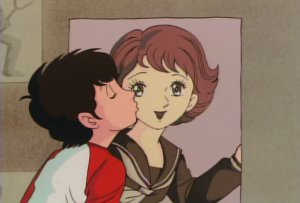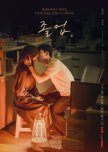
Deze recentie kan spoilers bevatten
Because night time is the right time, to be with the one you love, with the one you love
Korean language teacher Seo Hye Jin (a fantastic and stunning Jung Ryeo Won) is the spearhead of the Daechi-chase Academy, a private after-school institute (Hagwon, in fact) in the Gangnam district of Seoul, dedicated to strengthening and improving the academic development of students of various age levels;Entirely dedicated to her work, Hye Jin sees her life take a sensational twist when Lee Joon-ho (Wi Ha Joon, outstanding), her former best pupil, reappears. After giving up his career in a major company, he decides to become a teacher at the same school, with unpredicted consequences...
‘Midnight Romance In Hagwon’ is a beautifully delicate rom-com, capable of treating such a complex and burning theme as the articulated Korean school system, undoubtedly competitive and varied in its labirynthic set of rules, dogmas, social conventions and fierce struggles, all aimed at reaching the top of society itself. The drama, at the same time, is capable of touching us thanks to a captivating love story that escapes the banalities of the most predictable and sugar-coated romance, offering us an adult and decidedly structured relationship, also hindered by social conventions, work principles and even methodological differences.
The Daechi-chase Academy represents a kind of working microcosm where, along with the planned teaching structure, there is also a kind of subterranean ‘internal’ infighting within the Hagwon itself, where ‘there are no friends, everyone is in competition’ (summarised, in one of the clever dialogues, by the metaphor of hyenas and the ‘meal’) and where co-workers are ready to take advantage of any weaknesses of their own in order to advance their careers; certain founding principles of Confucianism are always emphasised, both for the role of teachers and for that of students.
Respect for hierarchy and seniority, the importance of teamwork rather than the individual's path, is portrayed, but almost as an antithesis to this, perfecting education and trying to improve oneself is given a central role, apparently individualistic concept, but accepted, as competition with others, for the best grades and for a job, which is also a better one, is a kind of ‘social lift’ necessary to reach the top of the hierarchical ranks of Korean society itself.
So intense is the competition between the different Hagwons (there are so many of them considering the extent of Seoul and its urban areas) that spy-story techniques to snatch secrets and steal each other's best students often reserve more than a few cheap shots to belittle and discredit the competitors.
In this kind of no-holds-barred law of the jungle, where profit and personal enrichment rule, a kind of feud evolves between the Daechi-chase Academy and the Choiseon Academy, led by the infamous Choi Hyung-sun, known as the White-haired Witch.
In this ill-concealed hypocritical society, closed and dominated by exasperated rhythms and widespread frustrations, both on the teachers‘ and pupils’ side, the figure of Seo Hye Jin -stunningly portrayed by Jung Ryeo Won- ends up being overwhelmed by the uncontainable vitality of Joon-ho (Wi Ha-joon, absolutely perfect in a part one couldn't imagine for anyone else);
The teacher Seo leads a methodical (and boring, it has to be said!) life, consisting of 16 hours of work a day, six days a week, with no traces of private life and no personal relationships, except for a couple of friends -he runs a pub, she is a lawyer-, with practically no relations with family members (there is a hint here and there in conversations with colleagues, but nothing more) and, above all, no sex life;
In the first episodes, we find ourselves following this robotic routine of meetings, scheduling, lectures, insights and sad lonely re-entries into an anonymous house that is almost a ‘non-place’ where Hye-jin seems to return just to sleep, which is a bit of a paradigm shift compared to so many beloved dramas where the house is often the focus of events or narrative plot twists.
It will be Joon-Hoo's unbridled and in some ways brazen audacity that will progressively undermine Hye-jin's convictions; not only the certainties of feelings, and here the noona-romance, as mentioned above, avoids the classic loopholes of the typical rom-com, also giving us a moment of extraordinary and very reserved emotional authenticity, but also -above all!?- the preponderant work vicissitudes, dealt with in some of the drama's topical moments, which offer a confrontation-clash of the highest level, where the dilemma over teaching methodologies instils the seed of doubt in the own Teacher Seo:
Whereas Hye Jin applies an almost mnemonic system where the pupil is directed to learn ‘by memory’ certain mechanisms of comprehension and learning, Joon-ho's style is more ‘ thoughtful’ where there is also a quest to convey passion for the literary subject.
Are the students, almost like machines, to learn and that's all, by memorising passages from books, practising calculating the probability of the questions in the tests, evidently ‘forgetting’ everything immediately after the exams, or are they to become passionate about the subject, perhaps with the opportunity (as in the case of Joon-Ho himself) to become the teachers of tomorrow?
It should not be forgotten that the Hagwons are extremely expensive schools, with families prepared to make considerable sacrifices in order to see a bright future for their children; parents demand the best from teachers and the discourse of ‘experimentation’ cannot prevail over the certainty of academic achievements.
The moment the boiling pot of the ‘clandestine’ relationship is discovered, and professional ethics in the workplace are called into question, the stigmatisation of the two teachers begins, victims not only of the oppressive work rules, but also of those previously mentioned founding principles that foment jealousy, hypocrisy and false respectability, where artfully fuelled slander can disrupt anyone's life...
I have already mentioned Jung Ryeo Won's superlative performance; her characterisation of Teacher Seo is so articulate, she has so many aspects, contradictions, weaknesses, but also resilience against adversity, that it is impossible not to be moved by the portrait of a 34-year-old woman who, confronted with the evidence of changes in her life and work, she finds herself rethinking all her principles and values pursued up to that point; that this sort of emotional switch is triggered by the vitality of the young (6 years younger) Joon-Ho is evidence of great narrative script.
There is, in my opinion, a certain affinity with the same emotional mechanisms of the beautiful ‘Encounter’, where youthful fervour, cheekiness and, let's face it, the right amount of arrogance deriving from one's enthusiastic confidence, prevails over a heavy, boring and, I would emphasise, grey ‘comfort zone’ of frozen maturity...
A great Wi Ha Joon, who is also perfectly mature in a very complex role, able to avoid the risk of falling into easy clichés and boring mannerisms, portrays a splendid character who is not afraid to shout his feelings to the world, not only making a breach in his beloved's heart, but, as a novel knight, defending her with his sword in the hardest moments, especially in the last episodes...
Their private, personal moments are beautiful, underlined by sincerely romantic and moving dialogues, almost ‘literary’ but never pedantic, capable of involving and melting even the least predisposed hearts thanks, it is important to specify, to a nocturnal scenario that often finds the two main characters almost ‘isolated’ from the rest of the world and that, at least for me, recalls certain classics of the past…
It has to be said that among the top-notch cast, I personally did not find the character of Choi Hyung-Sun, the so-called ‘witch’ played by Seo Jung-Yeon so interesting; she seemed a bit too caricatural, almost cartoonesque, a bit like Cruella De Vil, a bit like Miranda Priestly, far too mannered in characterisation...
Much better is Kim Jung-Young in the role of Assistant Director Woo, who is able to make her character grow exponentially with the dramatic progression of the story; she is a decidedly interesting character, fuelled by a resentment that has poisoned her life and who, when confronted with the main characters of the tale, reveals all her mediocrity.
I mention the excellent Kim Song-Il in the role of Professor Pyo Sang-Seob; these are those difficult characters, perhaps considered ‘marginal’ in the economy of the story, but which reveal unexpected qualities even with very few lines; his professional ethics, seemingly old-fashioned and mistreated, more for his attitude or his character disposition than for anything else (once again, appearances are mistaken for certainties), is instead surprisingly re-evaluated in the light of the extraordinary free lesson that the teacher offers his pupils; a truly outstanding piece of acting talent!
Personal curiosity: Between the office and the home of director Kim Hyun-Tak (Kim Jong-Tae), a film lover, one notices the framed posters of various films such as ‘Christmas In August’ and my much-loved ‘The Contact’ (with the goddess Jeon Do Yeon).
Of course, the drama is not completely perfect, in my opinion it gets a little lost in some conclusions that are not quite focused, between a catfight that is perhaps liberating (there is a lot of pent-up anger throughout the drama) but quite exaggerated, a second younger couple of low interest that has more of a function of lightening the narrative tension, and even the role of some students, at the beginning quite highlighted, is a little sidelined;
there is also an invasive use of the music, at the umpteenth ‘Open to page sixty four (don't forget about me)’, a bit like Carla Bruni's obsessive cover of Tammy Wynette in ‘Something In The Rain’, your blood pressure goes up a bit, but whatever, the soundtrack as a whole is pleasant and well structured.
As usual, there seems to be a need to make all the pieces fit together for an ideal closure, but nothing changes the magic of the story, which may not appear immediately engaging (the dialogues are definitely articulated and must be followed with a lot of attention) but which knows how to conquer, thanks to the wonderful work of the two main performers; let yourself be carried away by the emotions and you will be adequately rewarded, this drama will win you over!
8 ½
Vond je deze recentie nuttig?
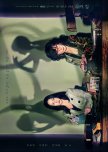
Deze recentie kan spoilers bevatten
You Must Be a Witch...
Very high expectations supported by a result that is not entirely satisfying, for this 'Bitter Sweet Hell', a reasonably good but not outstanding drama, capable of starting off in a very solid and engaging manner, but, as frequently happens in contemporary productions, able to end up losing a little focus in the development of the plot.Beyond the personal taste interpretation of the genre (it is definitely bold to consider BSH a generic 'black comedy'), the drama can comfortably be placed in the context of a family-based thriller, accompanied by the now overused theme of revenge linked to past events, where it is precisely the concept of family, in its multiple aspects, that provides the best key to interpretation and analysis.
Beginning as a phenomenological study of a typical upper-class Korean family (I imagine belonging to that famous 1% often depicted in dramas), 'Bitter Sweet Hell' has the merit of highlighting a harsh analysis of the family institution, highlighting through the failure of marriage, the dramatic and in many ways impossible ability concerning the proper management of interpersonal relationships within the same family unit.
That all this originates through the external factor of the criminal element of the plot, the notorious 'Witch', a sort of puppet master, capable of pulling the strings at his own sadistic will, is certainly one of the most interesting aspects in the development of the story.
The perfect, idyllic, but utterly fake and insincere portrayal of the family unit reveals all its fragility when the death of the patriarch (the always excellent Kwon Hae-hyo, also sacrified for plot exigencies), opens the infamous Pandora's box on the private vices and sins of the various family members...
The carnage game that ensues leads Dr. No, an eminent psychiatrist with a TV programme affiliated with her, to vacillate over the truth behind her own father's death, her father-in-law's responsibility and, at the same time, the mysterious disappearance of her own husband, the famous surgeon Choi Jae Jin.
Faced with the collapse of her certainties, purely selfish doubts about her own career, the resulting social status quo, and the safety/protection of her son (holder of an unmentionable secret), Dr No will even have to confront her mother-in-law, the famous mystery novelist Hong Sa Gang ('Cigarette Queen'), a lover of Agatha Christie and not at all resigned to the risk of a veritable media pillory capable of demolishing the few certainties left in the family...
The confrontation/clash between daughter-in-law and mother-in-law gives us the most enjoyable moments of the drama, thanks to the two prima donnas, perfectly placed in their roles; if Kim Hee Sun may seem a little more conservative with an extremely measured style (but she is just great style, as always, even if in the ending she literally loosens the reins as a mother bear protecting her cub) , in the intense performance of the always remarkable Lee Hye Young, we can really appreciate the ultimate feeling of the story, thanks also to a clever use of explicative flashbacks that add meat to the fire, enriching the plot and leading us to understand the sincere love of the novelist for her family, obviously impossible to explain in words, but comprehensible through the pages of books...
The moments in the whole part concerning the search for the husband/son Choi Jae Jin are very well presented, thanks also to the contribution of Park Kang Sung in the role of Ahn Kil Kang, handyman in the service of the novelist and manager of the 'Soft Hands' restaurant; the characterisation of Kim Nam Hee in the role of a genuine pusillanimous, only partly justified by the personal revelation about his origins, is very well done...
Among the drama's negative aspects, which unfortunately affect the final result quite a bit, I have to place the "Wicked" Lee Se Na, played by an inadequate Yeonwoo, in my opinion (it's always a personal thing, specific!) incapable of portraying a memorable villain, commensurate with the story;
if the explanation on the origin of Se Na's evil is decidedly conventional, even less is made clear as to how she could have circuited and manipulated more or less all the men (there is talk of three husbands, several lovers and even some women) in her revenge intentions;
The head tilt and a mocking glance are not enough to define evil, and the last two episodes, with the usual incongruities in the script and the obvious narrative strains, the sudden 'illuminations' capable of giving the drama a decisive turn, suffer greatly from this serious weakness (or casting error, to my way of thinking), dragging the story towards a rather predictable and even not very courageous ending.
Much, much better is the character of Moon Tae Oh (played by Jung Gun Joo) in the role of the main actors' son's tutor; in his case the roots of the evil are fully justified by deriving family faults and therefore deserving of a justified process of recovery, of 'salvation and redemption', unlike Se Na who, perversely guilty, as a pure 'witch' will meet her just fate....
Interesting is the role of Dr Oh Ji Eun (played by Shin So Yool), hopelessly in love, in search of familial acceptance and a victim in spite of herself of adult scheming and insensitivity...
Lee Se Na, Moon Tae Oh and Dr Oh herself represent in different ways three aspects of a family laceration with devastating consequences, irreparable in Se Na's case.
Vice versa, for the main character family, there can be a chance of redemption and new awareness through mutual solidarity, the ability to listen and understand, the principle of 'acceptance'; exemplary from this point of view is the role of the whole family towards the existential condition of their son Do Hyun (portrayed by a sincere and very human Park Jae-chan), and the appeal, albeit painful but necessary, towards memories (through letters, photographs, footage)
The pursuit of dialogue, sitting around the table, even if only to eat together once in a while, may seem a simple or obvious message, but it can be seen as a curative approach... From this point of view, the conclusion, although overly conciliatory, is quite in line with the development.
To sum up, in my personal opinion, 'Bitter Sweet Hell' is a good drama that lacks a bit of solidity in the second half, but is sustained by an almost completely successful cast and that has the virtue of not going on for too long; I would even have appreciated a couple more episodes to highlight the role of the novelist a bit more concretely, especially in her tormented relationship with her husband, but that's OK;
In some sections, I found several points of contact with the contemporaneous 'Hide' (which is however more reliable on the complex) with which, curiously enough, it shares the location of the holiday residence, the scene of adultery in one case and of crimes in the other...
Personal side note: Hong Sa Gang's car is absolutely awesome!
7/10
Vond je deze recentie nuttig?
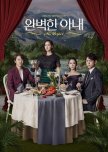
Deze recentie kan spoilers bevatten
Magnificent Obsession
"Ms. Perfect" is a scintillating melodrama with a classic flavour, able to offer an intricately multifaceted story that, starting from a fairly conventional family drama structure, with the end of a married couple's love affair at its centre and the relative painful disintegration of the domestic unit, gradually evolves into a fascinating and enthralling mystery thriller with an incredible story of mad love at its centre, absolutely indebted to the Hollywood classics of the golden age...Thanks to the chance offered by a singular and apparently perfect woman, a strange rental contract (extremely favourable! ) and a forced and curious cohabitation, accompanied by a heterogeneous group of family members, friends, and real or presumed servants, the focus of the story will develop in the new home of our heroine who, faced with ambiguously hostile characters and situations, gripped by doubts, feelings of guilt (not only her husband's betrayal, but also the uncomfortable presence/figure of her ex-first love) and even erroneous evaluations, will end up feeling threatened in the actual space of her new living location...
Trying to play with cinematic genres, in order to tempt the curious, “Ms. Perfect” seems to be the evolution of the so-called 'gothic movie', in its female variant, starring a woman, in spite of herself, grappling with a marriage affair with disturbing contours. Only in this case, the danger does not come directly from the male counterpart, but from the ambiguous and perturbing co-star, a true modern adaptation of the figure of the 'dark lady', a typical characterisation of the noir genre.
Everything is prodigiously served by a writing script that is never ordinary, capable of re-launching the plot each time with courageous choices, absolutely unsettling in many cases, at the service of a cast of an extraordinary level, able to alternate between comedy and tragedy, charade and drama, in a constant involvement that accompanies us throughout the wonderful twenty episodes, which show no sign of weakness or tiredness...
Intrigues and mysteries, real or presumed ghosts that re-emerge from a past with many interrogative aspects. As in the best tradition of Korean dramas, an underlying ambiguity appears that is able to characterise all the actors of "Ms. Perfect"... No one seems to be immune from guilt, albeit on different levels, and this ambiguity allows us to escape from easy "good/bad" classifications, thanks to a great performance by the whole cast...
The main attraction of this drama rotates around the astonishing performance of the charismatic Cho Yeo Jung, an actress of incredible beauty, capable, thanks to her immense and ambiguous charm, of portraying the role of a foolish woman in love, disposed to do anything to obtain the object of her desire... Absolutely ambiguous and sinister right from the moment she appears on the scene, Eun Hee becomes the true focal point of the narrative, catalysing the attention on her character who will progressively reveal her hidden object, concretely managing to raise the attention also on the omnipresent and obsessive relationship that connects stars and their fans (stalker! ?)
Sacrificial victims of his love madness are the "rival" Jae Bok, played by the also very beautiful Ko So Young (almost a twin sister of Kim Ha Neul!) and her husband, Jung Hee, brilliantly rendered by the excellent Yoon Sang Hyun, in one of the best roles of his remarkable career... In my opinion, it is precisely through the character of Jung Hee, in his progressive personality transformation, in the clash/confrontation with his wife Jae Bok, that some of the most interesting narrative cues emerge, capable of instilling doubts above all of a moral nature, on ambition, guilt and careerism at any cost...
It was said of the overall excellent cast where also the very good Sung Joon/Bong Goo makes his character evolve in a decidedly mature manner, thanks also to the exemplary part played by Im Se Mi/Na Mi who, mainly in the first half of the drama, shows a prominent role in the unravelling of the intrigued plot... I also really appreciated Jae Bok's two funny female friends, Na Hye Ran (played by Kim Jung Nan) and, above all, Kim Won Jae (Jung Soo Young) who could even have been used in more depth, given the psychoanalytic aspect emerging in the development of the storyline.... But, again, bravo to all, adults and children alike
There are many truly fascinating passages, often concentrated inside the vast mansion; the mysterious doors forbidden to all, also a typical noir cliché, almost an update of Hitchcock's "Rebecca" or so many of its epigones; Jae Bok's continuous wandering in the house, often intimidated by the presence of "hostile" figures; the effective use of flash-backs, which, thanks also to the classic repetitions of past traumas, reveal the many dark points of the principal characters... The confrontation between Na Mi and Eun Hee, Eun Hee finding herself alone in the huge house...And then one of my favourite movie tropes: The forced closure in the asylum, as well as the literally " flaming" finale that seems taken from a Roger Corman movie of the Edgar Allan Poe series....
Managing to satisfy so many of my cinematic obsessions, with an intriguing, engaging, well-written, perfectly acted tale, without moments of boredom or the usual lapses into more or less acceptable nonsense, 'Ms. Perfect' is a 'perfectly' successful example of excellent narrative script that meets absolutely exemplary mise-en-scene, creating a very entertaining story
9/10
Vond je deze recentie nuttig?
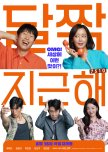
Deze recentie kan spoilers bevatten
Love can come at any time in our life
I watched this movie to detox myself a bit from a disappointing drama I ‘ve been watching in the past few days, also recommended by another MDL user, what can I say, really a happy breath of fresh air...It's a really pleasantly well-made romantic comedy that, without saying anything new, joyfully succeeds in engaging the well-prepared viewer for its two-hour duration (which is not particularly heavy at all, however).
It is in the choice of the main players that the movie's success is most evident; telling a love story with two mature characters, wonderfully mature I would say, but at the same time still young in their hearts and at the end of the day simply desperate to have someone at their side to love, like all of us...
The story is of disarming simplicity and the plot mechanics are those well established in the classic Korean rom-com: the main character, with his hilarious facial expressions, lost in his foibles and fixations, with an absolutely absurd and decidedly unhealthy job, the usual circle of colleagues/acquaintances more deranged than him, as well as the bothering element of his brother; on the other side, our beautiful Kim Hee Sun, a messed-up single mother with a teenage daughter, obviously problematic...
Rather than the usual clash-meeting between two completely antithetical entities, the most interesting element is surely the lengthy courteousness on her part, which allows the staging of several rather amusing scenes related to the total clumsiness of our male subject
But it is precisely in these phases of rapprochement of the two lonely souls, in this gradual process towards a state of happiness, that I found myself most satisfied, in that desire to attempt to experience the same joyfully adolescent emotions that can be found in so many dramas or movies, more or less good; that attempt at normality that leads us to think: "Why can't we experience the same joys too!"
Of course, there are the obvious lucky coincidences and even several innocent ingenuities that push the story towards the most obvious ending, thanks also to a supporting cast that is functional to its role, but in the end you are immediately inclined to cheer for the two heroes and therefore we welcome that bit of magical coincidence that leads to the happy end, just to have a Romantic Heart and believe/hope that love can come at any time in our life
The rating is a perhaps generous 7.5/10, but in cases like this it is OK to be kind...
Vond je deze recentie nuttig?
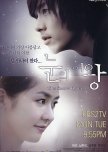
Deze recentie kan spoilers bevatten
A marvelous story of indissoluble love
A poignant drama, permeated with a deeply felt melancholy that accompanies us from beginning to end, The Snow Queen continues to be, in my opinion, a marvelous story of indissoluble love, capable of transcending any barrier, pushing (in all senses) towards extreme borders (not only figuratively speaking) thanks to the sincere romanticism of a practically perfect script and an excellent direction (the author is the same director of 'Winter Sonata', to be clear)As always, love, chance and destiny are preponderant elements that drive the story forward, but compared to similar cases, one does not turn one's nose up at any inconsistency, illogic or magnanimous demands for complete suspension of disbelief, since everything manages to be coordinated in a balanced and 'realistic' structure that also guarantees a sentimental identification with the beautiful characters of the drama...
The composite screenplay manages to overcome a linear storyline with a concentric structure, full of randomness and coincidences, alternating points of view, even narrative variations on the same theme, as well as subplots and geometrical plotlines that enrich the construction of the story, where even a few symbols or simple objects such as a pager, a music tape and a couple of photographs have the strength to release sincere emotion without trespassing on the pathetic.
It is achieved without falling into the baroque or exaggerated mannerism (typical of many contemporary dramas) that sometimes makes us raise an eyebrow or roll our eyes, thanks to skillful and never ordinary dialogue of obvious literary derivation, capable of arousing equal passion for two apparently antithetical subjects such as mathematics and boxing, and this is also possible thanks to a perfect cast in an absolute state of grace.
Hyun Bin renders his character's torment and remorse very well, with a truly calibrated, touching and involving performance, a prisoner of his own secret and bearer of an inner suffering bordering on self-destruction, almost Catholic in nature, even though the religious references (much more marked in other dramas of the same period) remain confined to a desperate prayer/invocation towards the end of the drama. Yu-ri -very gorgeous! -is absolutely perfect, capable of operating a sort of progressive transformation and dramatic growth that is functional to the narrative development of the story; the bumptious and spoilt little girl of the beginning of the story, ends up evolving and becoming a mature (young) woman, consciously resigned, in spite of herself, to her own fate.
The remaining cast is perfectly integrated in their roles without any pedantic backstory that in this case would frankly be considered pleonastic, with the exception of the excellent portrayal of Tae Woong's mother, who is absolutely decisive in further accentuating the protagonist's torments, and Bo Ra's father, capable of confirming once again that founding principle of dramas whereby the faults of parents end up falling on their children (in fact, he is responsible for the tragic fate of his eldest son)
Much has been written, and rightly so, about the extraordinary venues of the story, and the skillful use of the locations really deserves a separate mention, starting with the extraordinary landscapes in the opening, later reproposed in the last episode, to continue with the gymnasium, a sort of perfect microcosm populated by a group of marginalized people with a warm heart, which restores to us all the sense of sadness that lingers in the (icy!?) heart of the protagonist; Bo Ra's house, almost a gilded prison, up to the basketball court that returns also in the heartbreaking finale...
As is common in other productions, the role of nature is central, both in the snowy sequences and in those where it is the sea that increasingly, almost overwhelmingly, emphasizes the lyricism of the drama; for example, the sequences at the grave of the friend/brother, which personally have always made me think of my favorite Murakami Haruki book, 'Norwegian Wood' ...
Touching and melancholic without ever being intrusive, the soundtrack is the further strength of this extraordinary drama, a kind of contemporary fairy tale that is a truly perfect transposition of Andersen's sadly melancholic universe...
I decided to re-watch this gem a distance of a few years, after, what an irony for a drama-fan such myself! Fate has stripped me, in a short space of time, of some of the most beloved people who have accompanied my life... When one loses, affections, loves, friendships, beyond the pain and inner wounding, one questions oneself and seeks answers as to why things happen...
Just like the characters in the drama, we are constantly asking ourselves many questions, and the reflection on the differences between mathematics, which is always able to provide answers, and life, which acts by chance and very often does not provide answers, is perhaps the best possible metaphor or the perfect theorem to sum up not only this drama, but the lives of many people...
10/10
Vond je deze recentie nuttig?
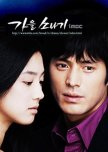
Deze recentie kan spoilers bevatten
Was it ever settled, Was it ever over, And is it still raining, Back in November
The two best friends, the aspiring architect Yeon Seo and the scientist researcher Gyoo Eun (respectively Jung Ryeo Won and Kim So Yeon, both very excellent and gorgeous), by a strange twist of fate, and, ignoring randomness, they find themselves meeting and dating, at the same time, the architect Yoon Jae (Oh Ji Ho, excellent) who, like in an Eric Rohmer movie, with playful complacency, unwittingly flirts with both of them, but ends up choosing the more passionate Gyoo Eun;Yeon Seo, despite her disappointment at the coincidence and relative ‘sentimental defeat’, accepts their union, in the name of the very strong friendship that binds her to Gyoo Eun, but a very tragic accident, during the honeymoon, will disrupt the lives of the three protagonists forever, bringing about dramatic and lacerating changes...
“TRY TO REMEMBER WHEN LIFE WAS SO TENDER WHEN DREAMS WERE KEPT BESIDE YOUR PILLOW.
TRY TO REMEMBER WHEN LIFE WAS SO TENDER WHEN LOVE WAS AN EMBER ABOUT TO BILLOW.”
As a product of a unique and, perhaps, unrepeatable season, ‘Autumn Shower’ is a beautiful and heartbreaking melodrama, marked by an underlying realism and a profound understanding of human frailty, capable of avoiding any easy moralism, circumventing the dangerous meshes of simple manichaeism, thanks to a remarkable script and an exemplary staging, capable of preserving such an equidistance that each (beautiful) main character in the story is confronted with his own weaknesses and his own reasons, in accordance with a deep understanding of human dynamics and, above all, of his own mistakes...
Ideally structured in two distinct segments (there is, of necessity, a ‘before’ and an ‘after’), with a first part of uncommon intensity, at times unbearable for the level of suffering represented -physical, of course, but also psychological - we are shown how a dramatic event - the incident and the coma - destroys the life not only of the victim, but also of the people most directly connected to her, with Yoon Jae, her husband anguished by guilt (he is directly responsible for everything that led to the incident), blamed by a livid Yeon Seo, but in fact ‘dumped’ even by his own family, who, in a moment of chilling selfishness, even proposes that he ‘abandon’ his wife (the marriage has not yet been officially registered) and immediately find for himself a new partner!
Love, duty, loneliness and repeated difficulties, even at work (total dedication to his wife, to the detriment of his own profession), on the shoulders of an all in all ordinary man, forced to face what is in any case considered a huge mistake and where the unpredictability of life can trigger a chain reaction, for which the moral condemnation is very little compared to the suffering already endured...
What may originally appear to be the ultimate act of unconditional love towards his bedridden wife, i.e. the subsequent registration of the marriage (‘Gyoo Eun, we are now officially husband and wife’), as well as the realisation of the dream house, will, on the contrary, represent a sort of ironic contrappasso in the development of the story...
And it is precisely in this desperate context, in this juggling of love, melancholy, discomfort and duty, between the despair of a possible extreme gesture and the promise made to his wife (‘I will wait for you, I will always be there for you’), that Yeon Seo slowly slips further and further into his life;
A tormented character on the verge of self-flagellation, Yeon Seo is initially torn by despair at her beloved friend's plight, but then by the inevitable torment at the betrayal perpetrated against her; the Australian interlude, an impossible ‘escape’ from feelings, even from those towards Soo Hyung, the doctor friend who has always been hopelessly in love with her, is only a postponement of the inevitable, all the more so because the deception is manifold, for in addition to the liaison, there is also betrayal of Soo Hyung himself, disillusioned by a naive and impossible acceptance of his love, and the consequent betrayal of the friendship between the two men, the doctor and the architect, who had for those two years formed a fraternal friendship.
“WE'RE TWO PEOPLE CAUGHT UP IN THE FLAME THAT HAS TO DIE OUT SOON”
At the moment when passion can no longer be repressed, where the selfishness derived from the awareness of feelings and the attainment of happiness predates, the clandestine couple flees from the world and their responsibilities (‘If we cannot go back in time, we must only follow our hearts’).
Escape as a necessity of life, as an impossible dream of a new existence, of a possible ‘familiar’ alternative in a fishermen's village, almost a ‘two hearts and a cabin’, as in the Italian expression, perfectly representative of the metaphorical separation from the outside world, sublimated by the renunciation of their telephones, and by their sincere and mutual confession recorded on an audiotape.
It is in this whirlwind of emotions that, ironically enough, the ‘miracle’ happens; the awakening from the coma is also an awakening of the senses in the two fugitives, who see their dreams of happiness shattered in the face of their new awareness; is a relocation of the story's pawns in the chessboard of life, the healing spell ‘condemns’ the players to their responsibilities, the husband must fulfil his duties and the lover flees again, going so far as to exclude herself from the general newfound happiness, avoiding the best friend who, unaware of everything, repeatedly seeks her out...
It is the moment when deception and guilt become unbearable, igniting the flame of suspicion in Gyoo Eun, initially unable to comprehend what everyone -except her- already knows, and which will be confirmed in the most direct and cruel way...
Yoon Jae is slowly squeezed between the two extremes, which plunge him into a vortex with no way out; he has no freedom to manoeuvre, only the fear of causing pain to one of the two women (wife or lover), the male protagonist, unintentionally cruel, forced by cowardice and insecurities to hurt the people he loves.
The female counterpart is split into two opposing and complementary characters (is she, on the whole, the image of the ideal woman!?), the lover, fragile and lonely, the wife who is determined to save her marriage, even at the sacrifice of friendship...
Adding salt to the wound is the unexpected pregnancy that carries much of the narrative scaffolding along the second half of the drama, decidedly unconventional in the way it relegates the male character to the background, leaving room for Yeon Seo's existential subjectivity, and the drama of the abortion, evidently sparked off by the stress arising from the confrontation-clash with Gyoo Eun, who is also, at this point, marked by feelings of guilt towards her (ex!?) friend who, once again, condemns herself to a wandering, a voluntary exile reminiscent of the existential path of a heroine from an old-fashioned melodrama...
“I'M LOSING MORE THAN I'LL EVER HAVE”
Does time heal all the wounds!?
After all this tourbillon of emotions, the question arises, because ‘Autumn Shower’, at least for my personal taste, is an all-encompassing experience, a sort of umpteenth interior road movie that leaves more doubts than certainties; a delicate study of feelings, a metaphor of maturation and - once again! - end of youthful dreams, well exemplified by Yeon Seo's touching letter;
Probably nothing seems destined to last, but the memory of past happiness is still alive in her heart and she will not accept to let it go. Who knows, with the course of time, maybe...
‘I loved them both, I am sorry because I loved them. And I am sorry because I could not be there for them.’
Magnified in its beauty by an absolutely brilliant cast, perfectly assembled in all the roles, with the two prima donnas playing a giant role in a splendid competition of bravura, with an excellent soundtrack that is so ‘out of time’ it manages to describe a world that perhaps no longer even exists, with those showers of rain that accompany the most touching moments of the story, 'Autumn Shower' seems to reflect, perfectly, that idea of the caducity of life, a sense of poignant melancholy (it is impossible to think of the story in another season!), the ideal passage from the season of joyful and unbridled vitality to that of calm and reflection...
Yet another significant piece that legitimises the multifaceted greatness of the Dramaverse.
8½ / 10
Vond je deze recentie nuttig?
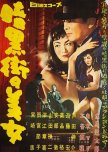
Deze recentie kan spoilers bevatten
Diamonds Are a Man's Best Friend...!?
At the time of the release of his ‘Underworld Beauty’ in 1958, Seijun Suzuki had already been, to all intents and purposes, a director employed by Nikkatsu for a couple of seasons (his debut dates back to 1956); this role, which we could define as a ‘ alimentary’ one, saw him engaged (or rather, obliged!?) in the production of at least three/four films a year (it seems to be a sort of Rainer Werner Fassbinder ante litteram...), given the enormous demand for movies of the period.In order to satisfy the tastes of the new film-addicted generation, Nikkatsu had embarked on a rich production of action/noir/gangster-style movies, inspired by American cinema, where often the stylistic/narrative themes of US-made genre films were adapted to the typical Japanese style and situations, so as to achieve a strong impact on the local audience (who got the message) with minimal expenses.
These were in fact low-budget works, perhaps of little artistic importance but perfectly functional at the box office and capable of bringing out a decidedly interesting generation of actors; To already established leading names such as Ishihara Yujiro and Akira Kobayashi, were soon to be added other performers such as the very ill-fated Keiichiro Akagi (who died at only 21 years of age, a sort of Japanese James Dean), Wada Koji and above all, Shishido Jo, who thanks to his connection with Suzuki himself succeeded in increasing his fame even outside the national borders.
In the midst of such a considerable amount of productions (in 1958 alone, Motion Picture Association of Japan, Inc. refers to 504 domestic productions and 169 imported films!), it was rather complex even for film critics to follow all the productions in circulation, all the more so as these genre films were often hastily classified as ‘B’ productions; but it was clear that in the midst of perhaps repetitive or easily forgettable films, it was plausible to find the classic ‘hidden gem’.
It is therefore interesting to observe how, in the context of a narrative structure that is still rather linear, at least at the outset, decidedly indebted to gangster movies made in the U.S.A. (Suzuki, by his own admission, has always been a lover of ‘Hard Boiled’ novels), ‘Underworld Beauty’ is characterised as a product of a high level, capable of also providing ‘in nuce’ several characteristic elements of our master's inimitable style:
Released from jail after three years following a robbery, the gangster Miyamoto recoups the diamonds from the crime, conveniently hidden, with the aim of reselling them to help his comrade Mihara, who was badly injured on that occasion, and his sister Akiko, a young woman with no prospects; his boss Oyane arranges an exchange with buyers, but the deal is scuppered when mysterious masked armed bandits appear; Mihara, in an extreme gesture of desperation, swallows the diamonds, but then falls from the roof of the building, dying of his injuries. From that moment on, a war breaks out between Miyamoto and his former accomplices to recover the precious stones, with the ex-con also working to protect the young and restless Akiko...
The starting premise is decidedly interesting and from the very beginning, the style appears clear, immediate, without frills or wasted time; Miyamoto -played by the mature and impassive Michitaro Mizushima- is a sort of lone wolf (exemplary synthesis of Chris D. in his fundamental ‘Outlaw Masters Of Japanese Film’) who, after having paid his debt to justice, feels obliged to ‘compensate’ his friend Mihara, who has suffered the highest price for the heist; from the very first lines, the ex-con appears to us as a sort of ‘modern Ronin’, alone against everyone, with few words and a lot of concreteness, an attitude that immediately leads him to set himself against his ex-criminal companions (and obviously the boss) who just don't want to give up the precious booty.
Curiously enough, in this ‘Underworld’ of criminals (real or could-be) where greed and lust for wealth, mixed with explicit primordial pulsions, seem to be the only values sought after, it is Miyamoto who comes out best of all, guided by an unshakeable ethic, nourished also by a double sense of guilt (first the incident and then the death of his friend) that leads him to risk himself in order to save Akiko (Mari Shiraki, perfect and always abundantly undressed), who, for her part, does not really represent the model of the ideal woman, but rather, with her youthful arrogance, sexual frenzy and unregulated life (she bullies and takes advantage of schoolgirls), she seems like a character straight out of the novels (and movies) of the Taiyozoku universe (‘Sun Tribe’), coming to characterise a sort of prototype of the more classic ‘Dark Lady’
If for Eric Von Stroheim money is always at the origin of all evil, here it is diamonds (3, in number... ) that unleash the most belligerent instincts of the characters who, in order not to renounce their earnings, are ready to do anything to recover the precious stones, triggering a series of situations that allow the skilful Suzuki to show his already characteristic technical skill, as well as his ability to synthesise (editing cuts, close-ups, sudden changes of camera angle), mixed with a good dose of his classic black humour that will distinguish him throughout his career; Emblematic from this point of view is the entire sequence with the mannequins as key figures, of great effectiveness and even amused mockery.
As far as the purely stylistic aspect is concerned, Suzuki works for the first time in widescreen, using a remarkable B/W that tends to emphasise the grey scales, with a result that is, to say the least, ‘brilliant’ (it is really appropriate to say so...) that amplifies, especially in the night sets (the majority), in an excellent play of light and shadows with an expressionistic cut, the ‘hard boiled’ dimension of the story; All this with a skilful and unconventional use of locations, including nightclubs, bars, rock ‘n’ roll, artists' studios and morgue rooms, as well as the boss's Turkish bath where the “incandescent” finale is set (in every sense of the word...), filmed with the master's decidedly distinctive trait, with clearly unconventional doses of sadism, explosions of violence and masterful shots even using a crane...
In his mature interviews, Suzuki will even refer to ‘Youth Of The Beast’ (1963) as the first film that can be considered entirely of his own from the point of view of narrative and directorial originality, but it is clear that already from this ‘Underworld Beauty’ (but in some points even from ‘8 Hours of Terror’ [1957]) the director began to set up that operation of ‘inner demolition’ of the genre which was to become his distinctive trademark, but which was to lead him, in 1967, to be sacked from the same film company for irremediable ‘artistic differences’ following his most famous picture, ‘Branded To Kill’.
9/10
Vond je deze recentie nuttig?
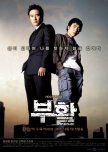
Deze recentie kan spoilers bevatten
I'm Never Gonna Die Again
A frankly disappointing and confusing drama, ‘Resurrection’ has the ambition of putting so much -too-much- meat on the fire in the plot, ending up giving an exaggeratedly complex and extremely confusing story; and it's a pity, because the basic assumption, on one of my favourite cinematographic themes, that of the double (but let's not bother Dostoevsky, of course! ), could and should have been exploited much better, instead being reduced to an accumulation of clichés and stereotypes that irregiment the story in a classic makjang scheme that is not even that engaging.The beginning is chaotic, to say the least, with the introduction of so many characters that it is hard to sort out the narrative patterns and the peculiar aspects of the actors on stage; evidently the authors must have realised this too, because at the beginning of the fifth episode, a providential summary of the previous episodes comes to our rescue, clarifying most of the tortuous plot, but beware! we will find ourselves with at least a dozen or more characters involved in what, up to that moment, has turned out to be a barely comprehensible affair...
Trying to sum up, more or less:
A policeman, his vice-presidential twin, the former's fiancée and the latter's almost-wife, aspiring journalist, a senator (father of the journalist but not only ... ) and another business executive (with his rather useless son), and their henchman/gangster, the twin vice-president's family - mother of the twins, stepfather and younger sister - and the policeman's adoptive father, several killers, dead or providentially brought out in the process, just to make even more of a mess, wives or ex-wives, real and alleged crooks, nosy journalists and even several policemen...
At this point, the story, so to speak, tries to stabilise itself for several episodes, which obviously, with the dramatic change of identity of the main character, have an easier time creating the right tension, relying on the gimmicks of the policeman who has to pass himself off as the twin vice-president of the company.
Nothing particularly memorable or innovative, it must be said; the ‘sentimental’ side is much more interesting, with the interchange between the two women in love who develop more than one doubt about the twin's identity, rather than the family aspect, with the anguish and turmoil of the protagonist's mother, which would have deserved more in-depth analysis; but we are nevertheless in the ordinary, the minimum acceptable:
It is the usual theme of revenge for a crime twenty years earlier that will uncover the classic Pandora's box, with a twist, largely phoned in and out of time, and that will take no prisoners...
But then, irreparably, the plot wraps up again, adding more characters to the story and rekindling confusion about it, as well as attempting to unravel it through the contrivance of some object/fetish such as the gaming dices or the bracelet
We are again in a total mess, with tired repetitions of protracted situations (the investigations of the would-be journalist, for instance), daring parental entanglements of the ‘that's the son of that other guy from an extramarital affair’ kind, searches for relatives, corrupt and then repentant cops, and others in a coma, as well as murderous killers who pop up out of nowhere (like the too-often-quoted Park Sangcheol).
It proceeds towards the finale with a sense of weariness and heaviness, a final episode in which we move from an anthology-like incipit of the ridiculous, with an explanation and related listing of names that would need another summary, an explanation so lengthy between the players that it verges on ludicrousness, to a hasty use of cinematic off-screen, hopelessly rushed in closing the stories of some characters who had been crucial up to that point.
Absolutely inexplicable the epilogue after the usual time jump (‘one year later’), ‘Resurrection’ leaves a sense of utter unfinishiness, despite the amount of material at hand, it is saved by some good performances, such as Uhm Tae Woong of course, in the double (or rather triple) part of Seo Ha Eun / Yoo Gang Hyuk / Yoo Shin Hyuk, as well as the beautiful Han Ji Min in the painful role of Seo Eun Ha, as well as Kim Gab Soo, in the role of Senator Lee Tae Jun, father of the journalist;
Kim Kyu-chul's grimacing in the part of Choi Dong Chan is frankly unbearable, while the final question that will remain unanswered is:
What happened to Seo Jae Su, Eun Ha's father and adoptive father of policeman Ha Eun, who at one point in the story simply disappears from the drama!?
6,5 / 10
Vond je deze recentie nuttig?
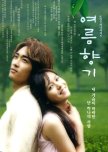
Deze recentie kan spoilers bevatten
O Foolish Heart
‘Summer Scent’ is the story of Min Woo, a man, an architect who has lost his love, Eun Hye, who died in tragic circumstances on their wedding day; he is completely devastated and decides to give up everything and move to Italy, to try to forget, to try to get by.After three years, however, he decides to return, after all he is an architect and has a family in Korea, maybe through work he has overcome the trauma, maybe he has forgotten Eun Hye;
‘Did you meet any girls?’ his best friend and co-worker Dae Poong asks him, ‘No, no girls’ he replies, ‘I tried to stay alive’ or something like that, says Min Woo, who seems yet another desperate case of tele-filmic misogyny.
He's bound to be your first love and that's it, there's no other possibility of new love....
But since all this stress has to be relieved somehow, Min Woo decides to go to the mountains, to one of those beautiful peaks surrounding Seoul, and at the top of the mount he meets Hae-won, a beautiful florist who is there to document rare plants and species;
Hae-won is not only a florist, but also a girl who has also been ‘reborn’ because she has undergone a life-saving operation, a heart transplant that now allows her to live a ‘normal’ life; she has found love, at least she thinks so, with Park Jun Jae, who has been her rich boyfriend since her school days, she is full of vitality, she wants to make up for everything she lost in her youth, in hospital rooms and deprivation, only the moment she meets Min Woo, her heart begins to stir and send her messages... And what could it be! ?
Due to a minor injury suffered by Hae-won, the two are forced to spend the night together in a small cabin in the mountains, not in the biblical sense eh, it's still a drama, but as two travellers who will say goodbye to each other the next day; only in this short time Min woo detects a variety of particularities of Hae-won that remind him of his deceased beloved...
‘Sometimes I feel like there are two people living inside me,’ thinks Hae won often, who of course still doesn't know it, Min woo doesn't either, but the heart beating in his chest is that of Eun Hye, Min Woo's deceased love; sounds familiar!?
Of course it is, in a nutshell it's the premise behind Return To Me, the lovely movie starring Minnie Driver and Dave Duchovny, so there's a good basis for a nice love story, but of course this is a drama and here things get terribly complicated, because on the horizon there's also the intrusive Jung Ah, who loves Min Woo without being corresponded, she too has returned from Italy to follow her (desperate) love;
‘She's like a little sister to me,’ says Min Woo, and this is the final nail in the coffin for any chance of a relationship between the two in the Dramaverse; but Jung Ah also happens to be Hae-won's best friend and sister-in-law by extension, being also Jun Jae's sister...
What a mess! But it's a pretty good mess, indeed...And we're only at the beginning!
Greetings and goodbyes and everyone goes back to their homes, end of drama, right?
But of course not, because Park Jun Jae and his family have to restructure a resort and this will take them the whole summer; architects are needed for the restyling and guess who, out of 11 million Koreans living in Seoul, a city agglomeration of 25 million (practically half of Italy) and who knows how many thousands of professionals who will win the project?
Obviously Min Woo and his partner/friend Dae Poong who will find themselves working throughout the season with Jun Jae, Jung Ah, Hae-won and even Jang-mi, Hae-won's Unnie, a sort of bizarre ‘stalker’ who collects photos of good-looking men...
Min woo and Hae-won, after the initial surprise and embarrassment, become closer and closer...
Over the years, I have resumed watching ‘Summer Scent’ several times and with different moods, even having been busy to translate the subtitles, but to this day, this drama of the Seasons cycle is the one that gives me the most headache;
towards the last episodes of the drama, there is a scene during which Hae-won and Min woo get together and confront each other, bringing into focus what I think is the moral dilemma of the drama:
Hae-won states that her love is destined to remain hopeless, because she believes that Min woo continues to love the late Un-Hae, who is alive in her trasplanted heart...
‘Summer Scent’ is then the story of a man who continues to love his dead girlfriend through another woman who is a kind of empty shell, a ‘wrapper’ or ‘container’!?
From the very first encounter in the mountains (the sequence at the airport is only an introductory frame and indicative of the subsequent dynamics), one undoubtedly has the feeling that the authors want to ‘trick’ us into confronting the dilemma of ‘who’ or ‘what’ acts as the fulcrum of the attraction between the two younger.
Is it Un-Hae's heart that ‘plays’ with feelings through the calla flowers, Schubert's ‘Serenade’, the flower petals in the tea, the references to rain in the clear sky, the house with the glass roof, introducing a pure fantasy subtext, so as to increase the spectrum of eventualities!?
It is Min woo who, desperately, projects the image of his deceased beloved onto Hae-won, even going to the extreme of recreating with objects and soundtrack an eerie ‘ideal scenario’ in the proposal room at a dramatic moment in the story!?
Or perhaps, much more conventionally, ‘It's destiny... If love is predestined your heart will beat fast even at the slightest touch’, as the more mature Jang-mi argues in an exchange of views with her florist friend...
Perhaps the beauty of this drama lies specifically in its unresolved narrative linearity, in a sort of enveloping haze - as in the sequence, beautiful! at dawn, near the house of Min woo's mother, a sequence that generates one of the many ‘misunderstandings’ that will later provide the definitive ‘proof’ of ‘guilt’ - a haze that does not allow us to clarify all the sentimental implications of the two main characters, but personally, much more prosaically, I like to think of a circle -the classic circle of destiny, yes- that opens with that beautiful initial consideration of Eun Ha and, ideally, closes exactly on the very final sequence:
‘...If my heart still beats when I am older, I want to meet the love of my life on a rainy day...’
‘Summer Scent’ has various flaws, but also many virtues that make it really attractive still after all these years, starting with the easiness of small gestures and the essentiality in the pursuit of building memories by two sincere souls who, inevitably, find themselves alone against the world.
The encounter in the mountains, the beautiful hills with the endless tea fields, the proposal room, the football pitch with the scene of the silent dance, the flowers, Schubert and his ‘Serenade’ also in the beautiful version by Nana Mouskouri (it must be said that Schubert did not exactly lead a blameless life...), the ‘forced’ stop on the island, all those extraordinary little things that make life worth living, those objects, sort of love fetishes that take on a central role in their lives, as well as that ‘slow’ rhythm, apparently not much appreciated by many viewers, but essential for contemplating and getting in tune with the central role of nature that, once again, underlines the work's magical lyricism.
And then all those big walks; throughout the summer, Min Woo and Hae-won do nothing but go, alternately, to Un-hae's poor parents who have gone to bury their despair in the middle of the woods, to grow all kinds of tea and to get there, or to Un-hae's grave they are forced to constantly grind miles; how can one not love these two pure souls and their yearning in the midst of those landscapes! Does such dedication not deserve due repayment?
It is yet another classic premise - two people whose existences are conditioned, who are not allowed to live their love - based on a possibly implausible event, (but aren't all melodramas ‘extraordinarily implausible’!?) which nonetheless leads us to ask; ‘Who governs the feelings! The heart or reason!?’
Perhaps not the best of the four segments, for it certainly isn't, it pays a little for the lack of an introduction, the powerful and well-articulated preamble, which, at least for my personal taste, usually takes up a couple of episodes and serves as an ideal building block for pathos. But these are small details, and ‘Summer Scent’ has a great cast:
Son Ye Jin, so beautiful and moving both in her enthralling joie de vivre and in the heartbreak following the unveiling of the truth, with the relative and inevitable sense of guilt towards ‘her’ family, with a split personality (‘You know, after the surgery, my personality has changed’ she tends to repeat) that makes her doubt even herself ('Is it me or is it Un-hae who rules me! ?"), she has all these intense close-ups that as soon as her eyes begin to moisten you're already starting to cry, not because it's a drama and therefore plays the easy pathetic card, but because every time she puts her hand on her chest you're afraid it's going to break -yet- her sweet heart, absolutely stunning!
Ye Jin finds a perfect partner in Song Seung-heon who, possibly because of the summer look with tan and rebel hair, looks even younger than in Autumn In My Heart; he too is messed up badly (the subject matter, in itself, provides for this) and unable to give Hae-won the sincere reasons for his love, evidently tormented by doubt, for much of the drama, about the sincerity of his own feelings (‘At first I was attracted to you because you looked like Un-hae’) he really is a soul in pain.
I mean, Min Woo, do you love Hae won!? Or his simulacrum!?
I absolutely adore the scenes and dialogues between the two main characters; we move from an initial phase, where Min woo has an attitude of almost controlled superiority towards Hae-won, where the first skirmishes are mostly dictated by frivolous situations, to a sort of role reversal, as the story proceeds and the truth comes out, with the beautiful florist reaching a greater awareness and determination, compared to a Min woo sinking into the darkest depression, definitely worn out by his inner turmoil.
Remarkable Han Ji-hye, in a crabby and obnoxious character, that of Jung-ah, the hopeless lover, able to make herself even ‘ hateful’ in her behaviour towards her almost sister-in-law friend, but also capable of pissing off Min-woo several times with her petty tricks to try to win him over; As I often like to say, when an actor (woman, man is indifferent) makes me angry about his or her role, it means that he or she has done his or her job very well.
Ryu Jin's work as Jung Jae is also well articulated, I would say unpleasant as well, for much of the drama, with his arrogant feudal-like sense of possession and his unbelievable coercions towards Hae-won, at a distance he brings out unexpected aspects of his own personality.
Jo Eun Sook (Jang-mi) and Jung Hoon Ahn (Dae-poong) are likeable and skilfully functional in the plot, but special mention must be made of the always superb Kim Hae-suk and, especially, Ha Jae Yeong as the missed in-laws, absolutely perfect in their respective parental afflictions...
Truly outstanding is the soundtrack not only as an ideal accompaniment for the story but, as in the case of the aforementioned Schubert ‘Serenade’, functional to the development of the plot itself.
‘Summer Scent’ is a roller coaster of emotions that has undoubtedly aged as well as good wine, I was pleasantly surprised to see it again and I think it can be considered an evergreen, decidedly more articulated and complex than one might expect, perhaps initially tricky due to the themes and dilemmas addressed, in addition to that ‘placid slowness’ mentioned above -which for me is a great virtue- and a cast of excellent level at the service of a very fascinating story...
Essential - like all segments of the ‘Endless Love’ cycle - for understanding and loving the Korean Wave phenomenon, ‘Summer Scent’ is a classic genre drama to watch, (re)watch and be loved.
8/10
Vond je deze recentie nuttig?
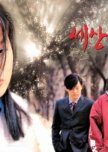
Deze recentie kan spoilers bevatten
Gift For The End
In the somehow archetypal structure, we can recognise one of the greatest qualities of ‘Forever Yours’, a 1998 drama that is still able to captivate even after many years, thanks to a well-defined narrative construction, as articulate in its form as it is fluid and linear in its execution, well supported by an excellent cast at the service of the story, full of (future) stars...The drama's development has continuous references to other famous productions that will arrive in subsequent years and is a real feast for all lovers of vintage television of the Asian country
We have the female character, Suh Hee (Kim Hee Sun) who is an orphan; she has been abandoned by her mother who, in one of the saddest scenes of the drama, disposes of her daughter, with the false promise to return soon to take her back; the headmistress of the orphanage who takes care of Suh Hee has a son, Sae Joon (Ryu Shi Won), with the highly promising talent of a future Doctor; Sae Joon and Suh Hee love each other, tenderly and innocently, as they do for many youngsters of their age, but Sae Joon's mother is a real witch who stands in the way of their love, because she wants her son to marry a girl from a middle-class family background...
It is a classic plot theme, one of the cardinal principles of movie and television melodrama; the absolute love that must overcome all boundaries and prohibitions, but it doesn’t end there:
Sae Joon has a friend (or supposed to be), the wealthy and vicious Min Hyuk (Kim Ho Jin) who, of course, falls head over heels for Suh Hee, falling madly in love with her (not hard to believe, given Kim Hee Sun's extraordinary handsomeness); Suh Hee is wracked with guilt, she is the indirect cause of an injury that compromises Sae Joon's life and future, she wishes for a better future for herself, she struggles with various jobs to scrape together enough money to live and, although she loves Sae Joon, ends up succumbing to Min Hyuk's advances, in a toxic relationship where the spoilt rich man's not only physical violence gets the better of the fragile character of the unfortunate orphan:
The result is the most classic of triangles with a continuous back-and-forth between the heroine and the two suitors, but it doesn't end there:
Suh Hee is pregnant by Min Hyuk; we've previously witnessed a horrible scene of violence and it's easy to see that this is the cause of conception, so what to do!? Have an abortion, or keep the baby in the hope that Min Hyuk will decide to marry her, perhaps finally growing up and taking responsibility!?
In the meantime Sae Joon tries to get on with her life, but he can't forget his first love; it's an incredible back-and-forth, with Suh Hee partly with one, partly with the other and partly running away, seeking comfort from her friends at the orphanage,
but it doesn't end there, because there's a further twist, absolutely tragic...
It is a drama that treads hard on the emotional foot pedal, all great dramas overflow with emotion, it is inevitable; they tell of human emotions, especially those that accompany difficult choices that require great courage, and love experienced in extreme circumstances or love thwarted. And the characters, of which there are many, even in the minor parts, accompanying the main story, find themselves lost, full of hope, but also locked in their own feelings, unable to manifest them;
As in the case of the friends from the orphanage, who are often unable even to find the right words to express their emotions;
In all the portrayals, the desire for a little happiness prevails, even if only for a few moments, because, as we have learned from so many other dramas, behind the brief moment of calm and happiness, unfortunately, the harshness of life immediately reappears, even ironically, by antinomy, and takes a toll...
Kim Hee Sun plays a character with a submissive nature, decidedly passive in submitting to the dictates of adults; Sae Joon's harpy mother is also a kind of surrogate mother for Suh Hee and in fact sees the two youngsters as ‘’siblings‘’, a further reason for opposing their love. The orphan is often level-headed in front of her and other respected adults (in terms of social status, etc.), responds in a low voice, unable to look them in the eye, weighed down by an atavistic sense of guilt that paralyses her even in her feelings and conditions her personal choices...
The Eun Suh of ‘Autumn In My Heart’ takes its cue from here, after all.…
The Hye Won of ‘Summer Scent’ also has several points of contact, as does the Soo Jung of ‘What Happened In Bali’.
Ryu Shi Won in the role of Sae Joon is probably the best defined character, because he is resolute, obstinate; the audience often needs to find itself, to identify with a figure, with a role, and in fact Sae Joon is this; We can describe him as the true protagonist, the hero of the story, decisive and direct; His love for Suh Hee is his North Star, even at the cost of going against his own family or his bright future; almost a work of abstraction from Shi Won who limits the dialogues to the essential, concentrating on gestures and expressions, with a personal style that he will replicate a couple of years later in the excellent ‘Secret’ with Kim Ha Neul and Ha Ji Won...
The Cha Song Joo of ‘Stairway To Heaven’ owes so much to the Sae Joon of ‘Forever Yours’...
Kim Ho Jin in character as Mun Hyuk is another good one; He is decidedly obnoxious and arrogant from the very first scenes, he arrives with an absurd tuft of hair, in the style of Brian Gregory from the Cramps, or Japanese anime of the 70s and 80s, which is perhaps the same thing, he plays the tough guy, but in the end his harshness derives mainly from his conflictual relationship with his father who considers him - not so wrongly - a perfect slacker; he too, unable to express his feelings in words, ends up translating them into bodily action with the absurd pretence that violence -goodness to him!- is nothing more than a different kind of love; He attempts a belated road to redemption but is too self-destructive a character and of spoilt rich dandies with self-destructive impulses the streets of the Dramaverse are paved...
Accompanying the main cast is Kim Sun Ah, young and already very pretty in the role of Ji Young, a female student of good social standing, suffering from a stutter, at the centre of a ‘secondary’ triangle that introduces rather interesting points of reflection on class differences, and also Kang Sung Yun, also a pleasant presence in the ensemble, in the unhappy role of the hopeless lover...
The lovely music theme, a kind of nostalgic, cadenced waltz, performed in various arrangements, is one of those tunes that immediately gets into your head and stays there; of course, it isn't Leonard Cohen, but it has that dose of unabashed old-fashioned romanticalism that adds just the right pathos to the story...
But then, is this drama good!? It's good yes, it's not perfect of course, here and there there are some slightly tired and repetitive parts, something in the characterisations also gets lost along the way, every now and then we even forget Sae Joon's invalidating condition, but fortunately in the last episodes the central theme comes back and the drama regains depth, putting the focus of the story back on the original love of the main characters, and closing well, with that very nice ending that can't leave anyone unmoved...
It does not have that aura of classics such as ‘Autumn In My Heart’, or ‘Stairway To Heaven’, ‘The Snow Queen’ and comparable masterpieces, but it has the great credit of having helped to mark out a way, to define some guidelines for undoubtedly more successful and celebrated series (and movies) and definitely deserves more favourable appreciation.
7½
P.S. I preferred to follow the title variant ‘Forever Yours’, in my humble opinion more pertinent than the perhaps too magniloquent ‘To The End Of The World’ used as the main title here on MDL
Vond je deze recentie nuttig?

Deze recentie kan spoilers bevatten
Journey Through the Past (Lives)
Next can be considered a successful experiment in unconventional or ‘alternative’ scriptwriting in the endless world of Korean series, in that the usual narrative construction of dramas here finds happy intuitions capable of relaunching the unfolding of the events in an engaging and exciting manner, thanks to a skilful expedient that finds in the inclusion of elements of psychoanalysis, suggestive keys to readings linked to the profound and fascinating theme of reincarnation.Starting from a rather common plot, the fortuitous encounter between the eminent young surgeon Ki Beom (Ryu Soo Young) and the beautiful theatre actress Jung Hwa (Jang Shin Young), the immediate love at first sight that ensues triggers a whirlwind of events with a snowball effect that also involves the two's respective partners, psychologist Soo Hyun (Park Ye Jin), who has been engaged to Ki Beom since school, and Ki Soo (Lee Jong Soo), a fellow actor unluckily in love with Jung Hwa but - watch out! also younger brother of Ki Beom himself
Jung Hwa's frail state of health, prostrated by a debilitating condition that effectively prevents her from sleeping, leads the actress to the office of Dr. Lee Soo Hyun, a psychologist who, unaware that Jung Hwa and her partner Ki Beom have in the meantime fallen in love, takes the patient to heart and, through repeated hypnosis sessions, manages to bring out what appears to all intents and purposes to be a case of reincarnation from past life experiences...
Almost as in certain Hollywood movies of the 1940s, or as in the coeval productions of the British company Gainsborough, where the main characters find themselves ‘’trapped‘’ between dream and reality, past and present, through the very fascinating element of psychoanalysis and hypnosis, the spectator finds himself catapulted into the previous lives of the four protagonists, thanks to another successful writing device, i.e. the inclusion of a story within a story, a movie within a movie, practically whole episodes, that will reveal the destinies of the characters' previous lives, through the different centuries and in the most varied sentimental concatenations.
A journey through the past, into different historical epochs such as the Mongolian invasion, the Joseon dynasty, the 20th century Japanese occupation, etc., where the ineluctability of fate will put the lives and loves of the characters to the test; The viewer is also left with the pleasure of choosing which moment in history has the most fascinating plot. Personally, the 13th-century segment with the ferocious Mongolian invasion (and a truly stunning Park Ye Jin!) and the 1900s under Japanese occupation, which is really beautiful thanks to the touching performance of the excellent Jang Shin Young, are among my favourites, while the last one, although it has a good initial idea, is a little more mechanical in its development.
Jung Hwa's inner voyage also involves the psychologist Soo Hyun who, inevitably overwhelmed by events, faces a process of self-discovery, resulting in an exploration of the unconscious, as if we were in an Ingmar Bergman or Robert Altman movie, which can bring about inevitable consequences...
The drama is also rich in recurring elements and symbolism (in addition to a particular figure that appears at certain times in front of the characters) such as the small mirror, representative of various metaphors and allegories, but also the principal instrument of female beauty and vanity, and the ancient knife, a death-bringing item that, on several occasions, becomes a ‘tool’ capable of triggering or determining the events of the stories themselves...
It has to be said that the quartet of performers is decidedly on form and offers truly remarkable characterisations; the two leading actresses manage to provide a great acting performance, truly multifaceted, capable of alternating moods and states of mind depending on the moments and perfectly in line with the development of the story; Park Ye Jin and Jang Shin Young are decidedly excellent both in the ‘contemporary’ roles and in the ‘historical’ segments.
On the other hand, Ryu Soo Young is particularly able to make the character of the surgeon Ki Beom complex, decidedly tormented by doubts, remorse, guilt, and so on, while Lee Jong Soo is very skilled in giving a nervous, even uncomfortable interpretation of the actor Ki Soo, with a strongly impulsive character and also decidedly tormented by his brother's relationship...
The brilliant ending, which, I imagine, must have displeased many, definitely breaks with the classic drama trend, but is in my opinion the only really possible one in terms of coherence and narrative logic.
The music is beautiful, providing just the right emotional soundtrack to a truly engaging and well executed story. In my opinion, this is an ‘8’ drama, which stands the test of time (obviously if you ignore the dresses, the phones and Ryu Soo Young's peculiar Tom Cruise haircut) and deserves its place on the roster of dramas to be rediscovered...
Vond je deze recentie nuttig?
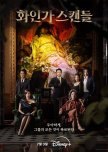
Deze recentie kan spoilers bevatten
Among My Swan
A much-anticipated action drama, not least because of its outstanding cast, ‘Red Swan’ unfortunately ends up betraying expectations, turning out to be a mid-level, almost routine release that fails to innovate the genre, slipping into an accumulation of entirely predictable narrative clichés.Apart from the good start, a solid first episode that, as is often the case, plays its best cards with a skilful use of various locations, the development of the drama wearily deals with narrative stylistic features that have been abundantly exploited in every makjang represented previously;
The most classic of the rich families, the usual viper's nest where everyone is ready to eliminate each other, slaves also to their own vices and unmentionable secrets, with a despotic and unbearable matriarch (a Seo Yi Sook decidedly over the top), an all too ‘efficient’ official in the administration of the family companies (a calibrated Yoon Je Moon, one of the best things in the drama) and the usual round of more or less legitimate children, concubines, lovers, etc.. all in the shadow of the patriarch, who obviously died in ‘mysterious’ circumstances and around whom the whole affair revolves, considering also the obvious inheritance that triggers the most unthinkable actions...
Obviously, a victim of circumstances, we find the main character O Wan Su (Kim Ha Neul), a former professional golf player, now Chairwoman of a charity created to help the most needy in the world, married -it is easy to imagine with what degree of happiness- to the eldest son of the rich family; Of incredible sadism is the choice of the writers, who force poor O Wan Su to face and accumulate over the course of the 10 episodes a catastrophic series of calamities so unbelievable and ridiculously absurd, with the beautiful Ha Neul who, untamed and imperturbably covered in blood (literally! ) advances through the accumulation of misfortunes with a temper of steel, backed by the policeman/bodyguard Seo Do Yun, played by a functional Rain, also an all-out hero -never a smile, at least until the final moments- determined to vindicate his friend colleague, killed while investigating the death of the aforementioned patriarch...
So, intrigue, espionage, crimes, double-crosses, betrayals (real or presumed) and all the typical repertoire of the genre that never gets going, never reaches the climax, proceeding along a banally predictable path, where all the elements end up converging on solutions already known; sin and guilt, expiation, justice, love, etc.. In the end, everything finds its usual repositioning in a kind of reparatory justicialism that leaves a bitter taste in the mouth, with a reflection on the true intention of the plot;
I don't know if it is due to Disney's production, it must be said that there is anyway a lot of violence that clashes sensitively with the image of the film company, but I had the feeling that the authors chose to play on a safe path, widely experimented in similar previous series, without any courageous or innovative choices, perhaps to please international producers, maybe to facilitate their export, but ending up offering an average product, quite forgettable, where even the supposed ‘chemistry’ between the two main characters struggles to come out, but at least Rain has the chance to show off some physicality with a few rather well choreographed action scenes, while Kim Ha Neul limits herself to a performance of ordinary administration; rather modest and often pedantic musical choices (there's even the requiem!) and an ending, after the inevitable temporal ellipsis (‘a year later’) of staggering ordinariness.
To be honest, not more than 6.5 overall, because it still makes itself watchable and does not drag on for long, for a drama on which I was betting so much and which in the end, in my eyes, turned out to be extremely disappointing
Unless I have missed something, even metaphorical, as was also the case with the titles of Italian thrillers of the 1970s that often mentioned various animals, there is no trace of red swans...
6,5
Vond je deze recentie nuttig?

Is the Breakup a Recall?
0 mensen vonden deze beoordeling nuttig
Deze recentie kan spoilers bevatten
Love Is All Around
I approached this show without any particular thought and with a bit of curiosity, I am not particularly familiar with everything related to reality shows, talent, cooking shows and the suchlike (I am not interested in them and have never watched any of them), but I was especially curious about Sung Yu-ri who I adore to madness and who I missed a bit, I wanted to see her in fresh productions and since she seems to be less interested in movies and dramas at the moment I agreed to follow her in this variety show...I must say it was a pleasant surprise with an idea that may not have been very original, but was certainly well developed, thanks to a remarkable cast that provided the right brio to the show; since there is no need to repeat the plot of the TV program (it is so linear that there is no need), I would like to make a few observations on the development of the variety.
First of all, I appreciated the changes made during the show, which improved the quality of the stories told and also the television timing; In the early days, the programme seemed a bit static, with the entire cast sitting on their sofas discussing relationships, break-ups, new loves, etc. (the references to their husbands, wives, etc. were also hilarious), but fortunately, over the course of the episodes, a more dynamic approach was adopted, which allowed the variety show to be even more engaging;
Both the use of the car, with the hosts taking turns as taxi drivers-narrators of the events, and the adoption of the 'drama-style' television format with the fictional events (often funny! ) created a greater engagement with the romantic stories told...
Clearly, it often happens that I identify with the stories of the couples narrated; beyond generational divergences, it is interesting to note the similarities and discrepancies in the birth of love stories and the causes of their break-ups;
I have often found myself a little baffled by certain motivations deriving from economic/work problems or even linked to alcohol consumption, but as I was taught by people wiser than me, one should never judge another culture with terms of comparison, in my case 'western'.
Ethnocentrism and widespread ignorance are so exasperated in the west that they often cause cultural blocks and prejudices towards the countries furthest away from us (I write as an Italian in love with the cultures of Asian countries... ); I have read enough about Korea to understand the social dynamics behind certain customs, especially in the world of work (and undoubtedly the movies and TV productions of dramas also contribute to a good extent), so I have been able to limit the background prejudices that occasionally linger in my mind.
As for the changes in the course, I appreciated less the use of the concluding video-call to see if the couple could have a second chance; I found much more romantic the opening of the door of the first episodes, with the appearance or not of the loved one, but they are still details that don't affect the quality of the show; for me it absolutely deserves 8½, it would be nice if it would be revived someday, there's always a need for love and hope, we live in really awful moments and programs like "Love Recall" are really a nice way to talk about love and maybe try to overcome the difficulties and start again.
Well done everyone, with a special mention for Jang Young Ran, really funny!
8½
Vond je deze recentie nuttig?
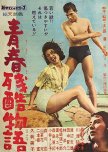
Deze recentie kan spoilers bevatten
Essential Masterpiece
In 1960, at the time of the release of 'Cruel Story of Youth', Japan was in the midst of a series of protests against the renewal of the Japan-America treaty (Anpo) and the related growing student movement; Oshima, like many of his contemporary colleagues, not even 30 years old at the time, was a keen observer of the ongoing changes, perceived this new feeling of revolt that would even lead to a split in the Japanese Communist Party towards even more radical ideas, and succeeded in making two other features that were strongly integrated in that historical moment.The picture is produced by the major Shochiku, a legendary company founded in the 1920s, which enforces the use of CinemaScope and colour, not particularly favoured by the new generation of filmmakers; The film studio is perhaps convinced that it can exploit the late 1950s phenomenon of the so-called "Taiyozoku Eiga" (Sun Tribes), movies based on Ishihara Shintaro's novels about the angry and dissolute youth of that period, but "Cruel Love Story" ends up by upsetting the cards, literally overturning the Japanese film table and pushing the pedal even deeper, highlighting the general traits of what will be defined in a simplistic way, Nūberu Bāgu, in response to the French ‘Nouvelle Vague’ film scene revolution , definition is certainly not appreciated by Oshima since, like other filmmakers of the time such as, for instance, Masahiro Shinoda or Yoshishige Yoshida, he feels more artistic (and political) affinities with the Polish cinema of Andrzej Wajda, in especially his 'Popiól i diament' (Ashes and Diamonds).
The plot is well known: Shinjo Makoto, a young under-age female student, and Fujii Kiyoshi, an idle aspiring gangster who met in the middle of a tragic situation, fall in love and decide to set up a racket where she picks up unsuspecting drivers who offer to accompany her (with obvious ulterior intentions) while he, on a motorbike, breaks into the scene at the right moment, threatening them with prosecution and beating them up, with the aim of extorting money from them... Of course, the consequences will have a price to pay...
The picture was a huge success with audiences and was critically read as the Oriental response to “À bout de souffle”, the first masterpiece by French director Jean-Luc Godard, starring Jean Paul Belmondo and the stunning (and very unfortunate) Jean Seberg; Behind the undoubtedly obvious analogies, starting with the style, the cinematic approach, the use of the hand-held camera (however with stylistic variations and more 'natural' movements than Godard or even the Brazilian master Glauber Rocha, who was also shortly to become the forerunner of the 'Cinema Novo' movement) and the display of close-ups, there is however a whole series of aspects that make Oshima's movie memorable:
"Cruel Story Of Youth" is characterised by a whole series of stylistic innovations and breaking elements, contravening the rules established by the masters, 'fathers' of Japanese cinematography such as Ozu, Mizoguchi etc. Pervaded by an existential pessimism that spares no one, Oshima portrays a generation, that of the twenty-somethings, of outcasts, completely lost in an absolute nihilism, in rebellion against any moral, social or political convention, devoid of dreams or ideals and with a self- destructive, absolute anarchic inclination to crime. Practically 'rebels without a cause', and without the extraordinarily melodramatic romance of Nicolas Ray's masterpiece with James Dean and Natalie Wood.
A revamping of conceptions capable of shifting the focus from the 'classic' representation of the family - think of Ozu and its role within the modernist changes in Japanese society, or Naruse for his work on ordinary people and the condition of women in the Land of the Rising Sun - towards a representation of identity and individualistic logics, linked to the new post-war and unconventional generations.
"Adults Don't Understand Me" ('Otona Wa Wakatte Kurenai') is the translation of the Japanese title of Truffaut's "Les Quatre Cents Coups" and behind this simplification one can summarise the confrontation-generational clash with the movie's adults, well represented by Makoto's older sister and her ex-lover, the doctor Akimoto, in a dramatically representative moment, in which all the disillusionment of the two mature ex-lovers emerges, aware of a generational failure that has wiped out all their youthful dreams (it almost brings to mind Ozu's movie of 1932), which is counterbalanced by Kiyoshi's spiteful observation that he has no dreams whatsoever and therefore does not risk ending up like them...
But there is also the deep frustration of Makoto's older sister Yuki, who admits to envying their freedom, even sexual freedom (explicit, in the truly adult dialogues that stand out from the start), along with the authorial inability of their father, practically reduced to a caricature incapable of any adult decision and, figuratively speaking, placed on the fringes of the conversations (and the frames).
Alone and aware that they are condemned to a sad, sordid existence, estranged from the strict rules of Japanese society, the two young lovers wander aimlessly, in the beautiful Michelangelo Antonioni-style pre-finale, 'lost' in their city, on their way to their inevitable fate....
It is easy to imagine the cultural shock the picture may have caused in 1960 in a country deeply lacerated by student revolts, by the wounds of World War II, in its attempt to raise its head again, opening up to the world in an attempt to show its best side;
Oshima, an exceptionally sharp master, manages to remove that gloss of respectability, almost of whitewashed sepulchres, taking what, in the hands of another filmmaker, could have been a noir or a conventional yakuza movie and providing the representation of a cynical world, without pity and hope that, in countless thematic variations, will pave the way for a truly rich cinematic decade for Japan. As far as I am concerned, it is one of the first Japanese cinema auteur movies that I have been able to appreciate since my youth, it was often televised at night, paired with Seijun Suzuki's 'Gate of Flesh' (another seminal director for me); the DVD version (on which I based the review) displays superior attention to subtitles, making more explicit the depth and rawness of the dialogues that were decidedly adult for the time.
Essential masterpiece
Vond je deze recentie nuttig?
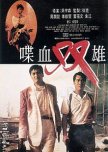
Deze recentie kan spoilers bevatten
‘You should have left Hong Kong immediately.... ...What kept you? ...Or who ?’
*‘The Killer’ was filmed in 1989 and came just after the great success of the two-hit diptych ‘A Better Tomorrow’. Chow Yun-Fat, who had already starred in the two ‘A Better...’ movies, was again called in as the lead actor. The results were so extraordinary that it was from this film onwards that Woo's name began to travel the world (in every sense of the word).The movie was conceived as a sort of modern remake of ‘Le samouraï’, a famous noir by Jean Pierre Melville, one of Woo's favourite directors, but the Guangzhou director readapted it, according to his precepts, giving us an action movie/noir, capable of merging with the most typical elements of melodrama...All infused with astonishing and spectacular shoot-outs, which, also from a choreographic point of view, will be imitated ad nauseam.
Woo, also a screenwriter, draws truly exemplary characterisations for the two main characters; By setting them against each other and starting from absolutely ‘antithetical’ standpoints (one is the killer, the other the cop) he manages, in a ‘miraculous’ way to make them converge and resemble each other thanks to the typical aspects of his cinematography.
Jeff is indeed a killer, but he is heroic, brave, full of passion, idealistic and sensitive...He has a sense of honour that really doesn't make him resemble an assassin, but rather an ancient knight who accepts his destiny and faces it head-on, without any fear, but rather with a mocking smile on his face; the brotherly, virile friendship and respect that bind him to Sidney is almost poignant, his best friend, also a hitman, physically maimed by a wound but vigorously animated by the same ideals as Jeff.
All fundamental elements in Woo's cinematography.
...And Chow Yun-Fat's performance is truly memorable...
The same rules of honour and moral principles that drive policeman Lee Ying: Lee of course hunts him down, but by some of Jeff's actions, such as the incident with the little girl and the run to the hospital, he is admired, if not actually fascinated, perhaps beginning to perceive the killer's true nature...the two men, moreover, are united by their respective senses of guilt, deriving for both of them from the responsibility of their gestures, which have generated two very serious events.
This common fate, infused with doses of old-fashioned romanticism, a sort of ‘chivalrous code’, a mèlo poetry and that sense of friendship so dear to Woo, triggers an irreversible process that leads all the characters of the movie towards a road of no return, in a sort of almost ‘martyrdom’...and emblematically it is precisely a church that is the place of the showdown.
The extraordinary film direction, as well as the editing, sets a tone of epicness to the entirety, leaving the viewer often open-mouthed, through a series of absolutely breathtaking sequences.
Much has been written about the famous shootouts in John Woo's movies: Choreographed, likened to a kind of a ballet, with unexpected and acrobatic changes of frame...Sudden slowdowns, moments of hiatus that precede extremely violent outbreaks, bodies and bullets leaping and whirling through the air, with the hero on duty moving while handling two guns at the same time (‘a dancer going through the air’ explains Woo), almost ‘in suspension’.
The application of slow motion then reinforces the impact even more, adding depth to the scenes and setting the pace. John Woo is perhaps the only director capable of making even a simple flight of white doves ‘epic’.
Watch ‘The Killer’...and then try to see the Mariachi trilogy by Robert Rodriguez, someone who really has a thing for action movies; Well, you'll notice how much the director of ‘Sin City’ drew from the Asian filmmaker.
Among the film references, I like to point out the boat race during Jeff's last ‘contract’; it has an absolutely Hichcockian ‘construction’, with a rising tension in the style of ‘The Man Who Knew Too Much’…
And there is also a quote from King Vidor's ‘Duel in the Sun’, really poignant...
'The Killer' is one of the high peaks of John Woo's career... it is probably the movie that best defines his cinematic universe and represents one of the most extraordinary modern examples of action movies (but not only).
A fundamental and highly recommended masterpiece.
10/10
-----------------
*An old review of mine from a no more existing forum, here for MDL, the names correspond with the Italian version of the movie
Vond je deze recentie nuttig?

